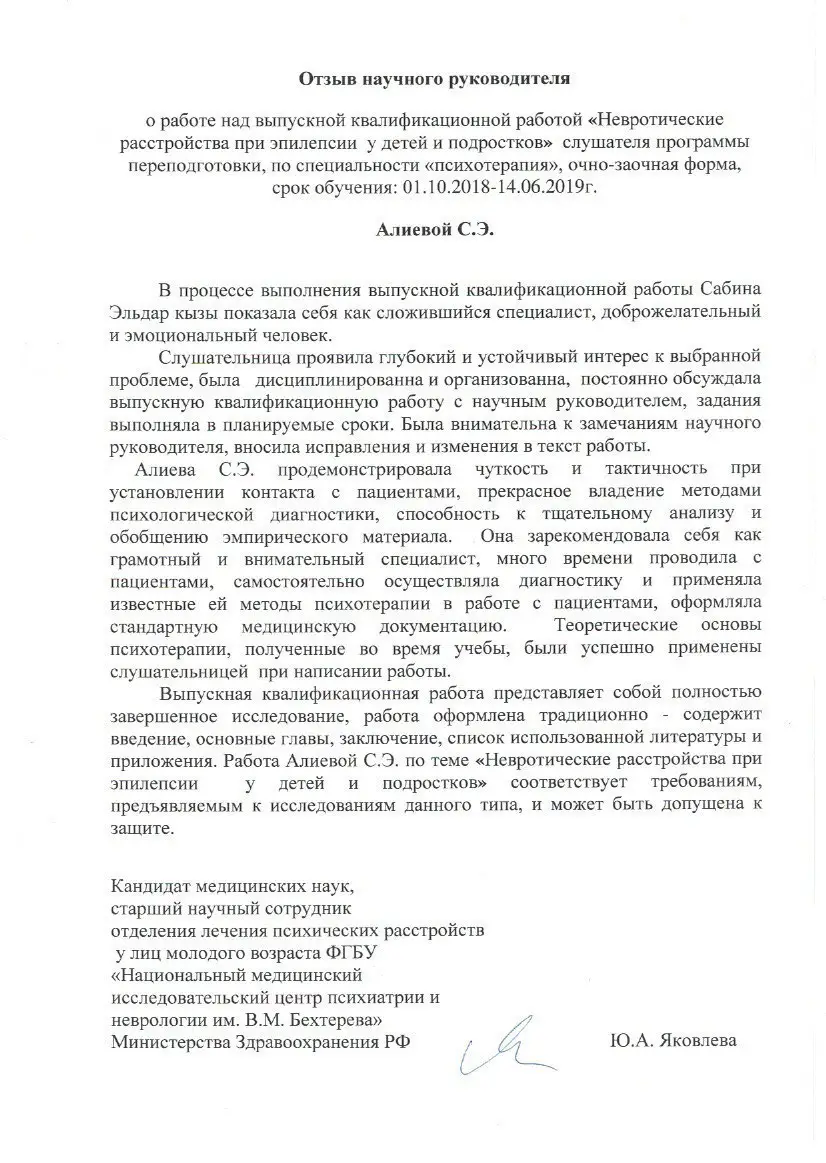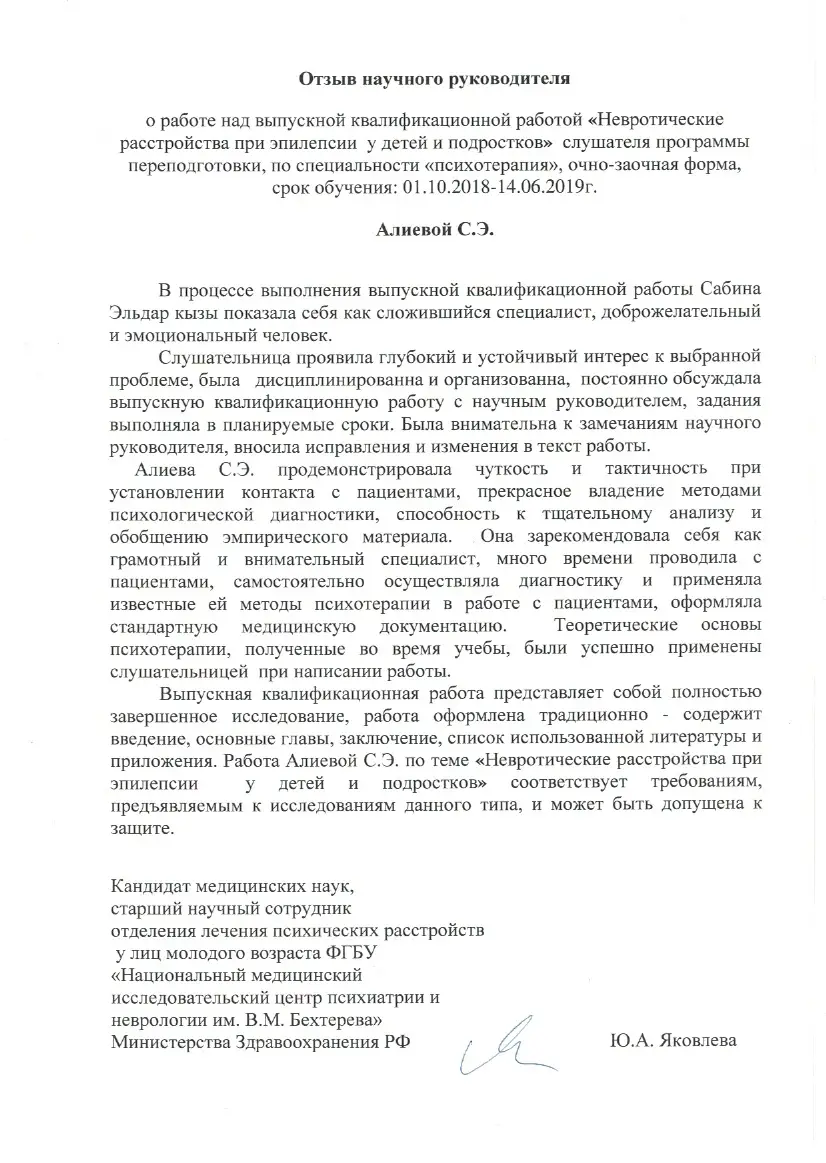Sabina Aliyeva
Psychiatrist
Psychotherapist
Psychologist
* child, adolescent, adult, family psychologist
A few details about myself

Hi, my name is Sabina. I am a psychiatrist, psychotherapist, and psychologist for children, teenagers, and adults, as well as a family psychologist from Baku. I find an individual approach to each client and always try to improve my profession. I help to understand difficult life situations and look at life in a new way.
Learn more
Learn more
Problems with nutrition and perception of appearance
Difficulties in the lives of children and adolescents
Problems with your partner and in family life
There are hallucinations or depersonalization/derealization
Unstable mood or anxiety, as well as panic
A psychological trauma that you find difficult to endure
Stereotype 1
Psychologist / psychiatrist / psychotherapist receives money just by sitting and listening to the patient/client
This is not true. Why? There are different cases. A specialist can actually, be silent for an hour and not comment on anything. There are times when you need to ask something, comment, etc. Everything is very individual. It happens when a client comes and is silent for an hour. Sometimes a person just wants to be quiet.
Articles

SCHIZOPHRENIA
Schizophrenia is a chronic mental illness that is characterized by the violation of thinking processes with relatively intact intelligence, which is combined with significant emotional impoverishment and decreased volition
DEPERSONALIZATION-DEREALIZATION DISORDER (DPDR)
DPDR is characterized by the violation of the perception of the world — the person thinks they are in a virtual game, and all the surrounding objects and living beings are flat or have a surreal color.
TOURETTE SYNDROME
Tourette syndrome is a psychoneurological disorder that is characterized by tics. Tics are spontaneous movements, sounds or verbal expressions that occur with no control over them. They occur spontaneously.
DEPRESSION
Депрессия является одной из ведущих причин инвалидности. Самоубийство является второй по значимости причиной смерти среди людей от пятнадцати до двадцати девяти лет...
GENERALIZED ANXIETY DISORDER
Generalized anxiety disorder (GAD) is quite common, about three percent of the population has this disorder. GAD is different from other anxiety disorders. In GAD, the disorder is not bound to a specific situation or a fear of having a panic attack.
PHOBIC DISORDER
A phobia is a symptom characterized by the occurrence of uncontrollable fear under certain circumstances. In psychiatry, phobic disorders are those that are associated with fear in relation to any objects, movements, actions, acts, situations, or even people. A phobia can be anything from ordinary life.
СИНДРОМ ДЕФИЦИТА ВНИМАНИЯ И ГИПЕРАКТИВНОСТИ У ВЗРОСЛЫХ
Синдром дефицита внимания и гиперактивности у взрослых
РАССТРОЙСТВА АУТИСТИЧЕСКОГО СПЕКТРА У ВЗРОСЛЫХ
Расстройства аутистического спектра у взрослых
СИМПТОМЫ ПОГРАНИЧНОГО РАССТРОЙСТВА ЛИЧНОСТИ
ОСНОВНЫЕ СИМПТОМЫ ПОГРАНИЧНОГО РАССТРОЙСТВА ЛИЧНОСТИ
МИЗОФОНИЯ

ALEKSITIMIYA

Sinesteziya
Diplomas
Characteristics
Certificates of advanced training
Questions and Answers
About psychiatry
What is psychiatry and why is it needed?
Psychiatry is a branch of clinical medicine that studies mental disorders and deals with their treatment, prevention, and care for the mentally ill.How does a psychiatrist help?
A psychiatrist helps treat mental disorders. You don't have to be afraid to go to a psychiatrist. You can visit it in the same way as others, for prevention. This is normal and there is nothing terrible about it. You don't have to feel bad to see a psychiatrist.How long does a psychiatric appointment last?
In different ways. If in psychotherapy 50-55 minutes is the norm, then in psychiatry each doctor has a different session duration. There are severe cases when it takes a little longer than usual.How is the diagnosis made?
The diagnosis in psychiatry does not take first place, because it cannot be made in an hour. There is a preliminary diagnosis for documents or for the doctor himself. After some time, the doctor can change the diagnosis to the one that the patient has. In psychiatry, symptoms must be treated. Yes, there are disorders that cannot be confused and are immediately visible, such as “panic disorder”. But in psychiatry, there are a lot of similar disorders that are not so different from each other.What is withdrawal syndrome?
If you abruptly stop taking medication, very unpleasant symptoms can occur. Most often, with withdrawal syndrome, a person has fatigue, a headache, he is sick, and “shakes”. Many other symptoms may also occur, from a runny nose to irritability. This usually goes away in 1-2 weeks.Do antidepressants cause addiction?
There is a huge stereotype that supposedly antidepressants cause addictive. They don't. It's a withdrawal syndrome. It also happens that a person is in a terrible state, he has been prescribed medicine and told to be in touch or come back in a month. The patient takes medicine, they feel much better than before. And they are afraid that the previous state will return and because of this they continue to take medicine, even if it has already been canceled. This is not an addiction. This is fear.Why are many people afraid of psychiatrists?
Unfortunately, not everyone perceives our profession and not everyone understands it. Our profession is difficult but very interesting. It is impossible to know everything in the world and understand everything. If a person does not understand what psychiatry is and why a psychiatrist is needed, you can turn to the Internet with this question, ask relatives or other doctors, for example, your therapist.Psychiatrist and psychologist: what's the difference?
These two professions are often confused, but they differ significantly. A psychiatrist is a doctor, who studied medicine, then graduated from it. Have the right to prescribe medicines. A psychologist is not a doctor. The psychologist graduated from the Faculty of Psychology. They have no right to prescribe medicines.
About psychotherapy
What is psychotherapy, where and why is it used?
Psychotherapy is such an interaction between the doctor and the patient, in which the conscious and unconscious painful experiences of the patient are revealed and disappear. Psychotherapy is a healing process that is based on certain psychotherapeutic techniques and has its own rules for conducting it as a treatment.How does a psychotherapist help?
A psychotherapist is needed both for the rehabilitation of patients with serious illnesses, and for the treatment of disorders that in one way or another interfere with living, working, building relationships, and being creative. The therapy significantly improves the quality of life.How is psychotherapy carried out?
It is carried out, as a rule, by a specialist psychotherapist, by establishing deep personal contact with the patient (often through conversations and discussions), as well as using various cognitive, behavioral, medication, and other techniques.How long does psychotherapy take?
The course of psychotherapy takes from several months to several years: the duration is determined not only by the severity of the problem but in many respects by the client's readiness for change (conscious and unconscious).How many patients visit a specialist per day?
Doctors of all specialties also experience burnout, which is normal. Psychotherapists most often see 5-6 patients a day in private practice. Taking more patients in a day can lead to burnout. Of course, everyone is an individual and it is up to the specialist to decide what schedule to set for themselves.
About me
Where do you receive clients?
At the moment, I work and receive clients in the Medikus clinic.Where is the Medikus Clinic located?
The clinic is located near the Inshatchilar metro station, at Abbas Mirza Sharifzade, 55.How can I sign up for a session?
You can sign up for a session by clicking hereHow much does one session cost?
For pricing information, please email or call me.



















































